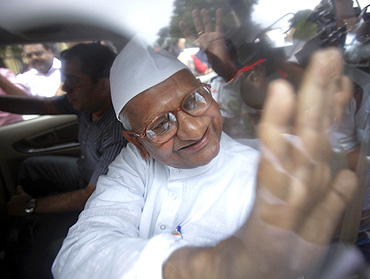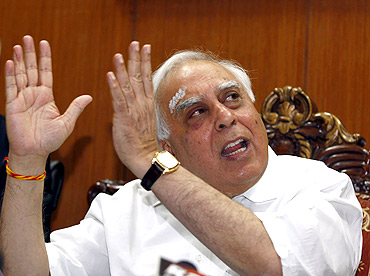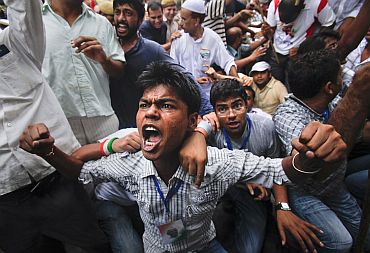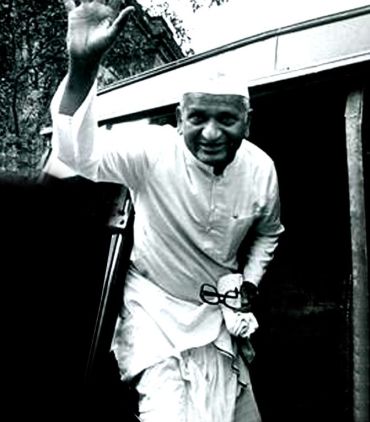Photographs: Reuters A Rediff.com correspondent
A Rediff.com correspondent explains the many twists and turns before the decision to arrest Anna Hazare on Tuesday morning.
When social activist Anna Hazare was arrested on Tuesday, his team did not file any petition in the Supreme Court. They wanted to discuss the matter with Hazare and his associates, Right to Information crusader Arvind Kejriwal and former Union law minister Shanti Bhushan.
Their thinking was that instead of asking for bail from the court, they should see that the entire case is quashed.
Hazare's legal advisors are the father and son team of Shanti and Prashant Bhushan.
According to the Bhushans, two Supreme Court judgments are most important to fight the government's legal action. Home Minister P Chidambaram is a lawyer as is Telecom Minister Kapil Sibal, who are said to have formed the strategy to arrest Hazare, which will surely be challenged in court.
Two legal issues were involved in Hazare's arrest. One involved his Constitutional right to protest, the other, the Delhi police's decision to impose Section 144 of the Criminal Procedure Code at the venue where Hazare planned to fast.
On both issues, there are landmark judgments that celebrate the Indian people's right to protest.
A Constitution Bench of India's Supreme Court in one landmark judgment held, 'The right to hold a public meeting in a public street is a Fundamental Right and rule 7, which gives an unguided discretion dependent on the subjective whim of the authority to grant or refuse permission to, hold such a meeting, cannot be held to be valid. Freedom of assembly is an essential element of a democratic system.'
This judgment was delivered the Himmatlal Shah versus Commissioner of Police case in 1973 in which the court ruled, 'The basic assumption in a democratic polity is that the government shall be based on the consent of the governed. But the consent implies not only that the consent shall be free, but also that it shall be grounded on adequate information and discussion.'
'At the root of this concept lies the citizen's right to meet face to face with others for the discussion of their ideas and problems, and public streets are the 'natural' places for expression of opinion and dissemination of ideas,' the judges pointed out.
The Supreme Court clarified that 'Public meeting in open places and public streets forms part of the tradition of our national life. In the pro-Independence days such meetings have been held in open spaces and public streets and the people have come to regard it as a part of the privileges and immunities."
Please ...Did Chidambaram and Sibal goof up?
Image: Telecom Minister Kapil SibalIn an another judgment, Madhu Limaye versus Sub-Divisional Magistrate, the Supreme Court had stated, in 1971, that Section 144 of the Criminal Procedure Code is an emergency provision to be used only in grave situations of public disorder.
The seven-judge bench had held, 'The gist of action under Section 144 is the urgency of the situation and its efficacy in the likelihood of being able to prevent some harmful consequences. It is not an ordinary power flowing from administration, but a power used in a judicial manner and which can stand further judicial scrutiny. As it is possible to act under the Section absolutely and even ex-parte the emergency must be sudden, and the consequences sufficiently grave.'
If one closely reads the chronology of events, it is puzzling why Chidambaram and Sibal, two prominent lawyers and senior ministers in the government, took the decision to stop the Hazare movement in this crude manner.
The to and fro communication between the Delhi police and Hazare's India Against Corruption campaign is very important to judge the issue in the right perspective.
India Against Corruption activists told Rediff.com that they had earlier informed the Delhi police that Hazare would conduct an indefinite fast at Jantar Mantar in New Delhi from April 5. The Delhi police at that time neither asked for an undertaking nor imposed any restrictions on Hazare's proposed fast.
Hazare and others commenced their peaceful agitation on April 5. Since the agitation received large public support, the government was forced to agree to the IAC's demand on April 9, and issued a notification constituting a joint drafting committee for the Lokpal Bill.
Hazare and others participated in this agitation for four days without any hindrance.
The IAC members further state, "On June 4, Baba Ramdev started an indefinite fast raising concerns regarding black money at the Ramlila Maidan in New Delhi. After midnight the same day, thousands of the gathered people were brutally evicted by the Delhi police using teargas shells, a lathi-charge which injured many including women and children. The Supreme Court took suo moto cognisance of the crackdown on democratic rights, and issued a notice to the Centre and police."
The IAC decided to hold a day-long fast at the Ramlila Maidan to protest this eviction. They informed the Delhi police about their plans to assemble at Jantar Mantar on June 8.
Delhi police officers met IAC leaders and denied them permission to convene at Jantar Mantar, but suggested that they could agitate at Rajghat in New Delhi. The IAC accepted this suggestion and held a day-long agitation at Rajghat on June 8.
The Delhi police did not ask for any undertaking from the IAC in this instance as well.
Please ...The Delhi police demanded an undertaking from Team Anna
Image: Supporters of Anna Hazare hold his portraits during a rally against corruption in ChandigarhPhotographs: Amit Verma/Reuters
Meanwhile, the proceedings of the Lokpal Bill drafting committee ended with the government refusing to accept the recommendations which Hazare and his team wanted incorporated in the Lokpal Bill.
Hazare and his team claimed they felt betrayed by the government and decided to agitate against what they perceived as the lack of sincerity on the government's part in fighting corruption. It was decided that Hazare would conduct an indefinite fast in New Delhi from August 16.
Thus commenced a battle to secure a venue for the fast.
On July 15, the IAC wrote to the deputy commissioner of police, New Delhi, stating 'Anna Hazare will sit on an indefinite fast at Jantar Mantar from August 16 if the government does not present a strong Lokpal Bill.
IAC activists say the additional commissioner of police, New Delhi district, responded the same day, saying that an undertaking would be required to be given and 'without such an undertaking, you will not be allowed to organise and hold the proposed dharna.'
That undertaking would need permission from the land-owning authority, that no shamiana would be erected, acknowledging that there would be restrictions on loudspeakers, that any procession would not last more than four hours, etc. More than 20 conditions were cited by the Delhi police.
The Delhi police cited a Supreme Court judgment relating to the Destruction of Public Property of 2007, which has nothing to do with the kind of undertaking asked for.
"It is clear that this was done at the behest of the central government for politically motivated reasons," alleges an IAC spokesperson.
Please ...What the Delhi police wanted next
Image: A protest rally in support of Anna Hazare in New DelhiPhotographs: Adnan Abidi/Reuters
Since the police had asked the IAC to get permission from the land-owning authority for the fast, the IAC wrote to the chairperson, New Delhi Municipal Corporation, seeking permission on July 27.
In response to the Delhi police letter dated July 18, the IAC responded with a letter to the police on July 29, stating, 'Since it is an indefinite fast, we would not be able to give you the duration of the fast.'
The IAC added, 'It is very difficult to ascertain the number of people who would come. Corruption is an issue affecting the day-to-day life of people.'
Section 144 of the Criminal Procedure Code bars the assembly of five or more people without permission from the police. It was reported that the Delhi police decided to impose Section 144 CrPC in most parts of New Delhi.
On July 29, the IAC wrote another letter to the Delhi police stating, 'It has come to our notice... that the Delhi police has imposed Section 144 in most parts of New Delhi, including Jantar Mantar, citing security reason... we would be grateful if you could inform us of the exact status of our request.'
On August 2, the Delhi police wrote to the IAC, stating the permission for the fast at Jantar Mantar had been denied.
The Delhi police letter stated, 'Since your information is evasive, vague and incomplete, and taking into account that Jantar Mantar has a very limited space... Delhi police expresses its inability to accede to your request.'
The same day, the IAC responded with a letter to the Delhi police Commissioner, suggesting alternative venues for Hazare's fast.
The IAC letter said, 'Though we are not convinced with the reason for denial, if you feel that Jantar Mantar Road is inadequat... we are suggesting the following places.' The IAC suggested Boat Club, Rajghat, the Ramlila Maidan and Shaheed Park.
The IAC also stated that it was ready for any alternate venue which is close to central Delhi and well-connected by bus/Metro.
The IAC on August 3 wrote to the deputy director of horticulture, Municipal Corporation of Delhi City Zone, seeking to book the Ramlila Maidan from August 16 to August 31.
On August 5, the IAC wrote to the Delhi police commissioner requesting an appointment. Committee members Prashant Bhushan and Arvind Kejriwal met him.
The Municipal Corporation of Delhi on August 5 granted the IAC permission to hold its protest at the Ramlila Maidan, saying the venue was available from August 15 to August 31. However, it asked for a no objection certificate from the Delhi police.
The same day, the IAC wrote to the Delhi police informing it that the IAC would hold the fast from August 16 to August 31 at the Ramlila Maidan.
On August 9, the Delhi police wrote to the IAC that conditional permission could be granted near the 'fenced space behind Daryaganj walls' near Rajghat, subject to getting permission from the director general, Central Public Works Department.
On August 10, the Delhi police wrote to the IAC that conditional permission for the Jayaprakash Narayan (JPN) Park near Ferozshah Kotla could be graned, subject to permission from the land-owning authority.
The Delhi police did not talk about any undertaking in both its letters.
Please ...What is the government afraid of?
Image: Anna HazareThe IAC was agreeable to JPN Park as a venue and wrote to the secretary, ministry of urban development, which is the land-owning authority for the park, on August 11, seeking a no objection certificate.
The Delhi police now wrote to the IAC on August 13, saying. 'We have now been advised that the proposed venue cannot be allotted beyond one or two days' and put forth 22 conditions.
The conditions said the IAC shall vacate the venue on August 18, and thus would hold its protest for only three days, that the IAC would have to ensure that the gathering does not exceed 4,000 to 5,000 people, that government doctors would examine Hazare's health three times a day, that only 50 cars would be allowed etc.
The IAC on August 14 gave an undertaking, accepting 16 of the 22 conditions set by the Delhi police. The IAC accepted that no damage to public property would be caused; no provocative speech would be made; no crackers would be burst; that sufficient volunteers/security guards would be deployed; that drinking water, mobile toilets, medical aid, adequate lighting would be provided; no lathis, firearms, spears, swords etc would be brought to the venue.
The undertaking signed by Anna Hazare, Shanti Bhushan, Kiran Bedi, Prashant Bhushan and Arvind Kejriwal stated, 'We shall be responsible to keep the followers under control, failing which I along with other organisers and protestors may be prosecuted under the law.'
The IAC did not accept the restriction on the number of days or the number of people present at the fast.
The Delhi police on August 15 wrote a letter to the IAC stating, '...you have refused to give an undertaking on all the points, as required by us. Therefore... the permission for fast/dharna at JPN Park cannot be accorded to you. You also do not have permission from the land-owning agency. Therefore, you are informed that any assembly by your organisation at that venue would be unlawful.'
The Delhi police then imposed Section 144 Criminal Procedure Code at JPN Park; it was already in force in central Delhi. Then they arrested Hazare and other members of his team from their homes.
What remains unexplained is this: Why is the United Progressive Alliance government so afraid of Anna Hazare's proposed fast?






article